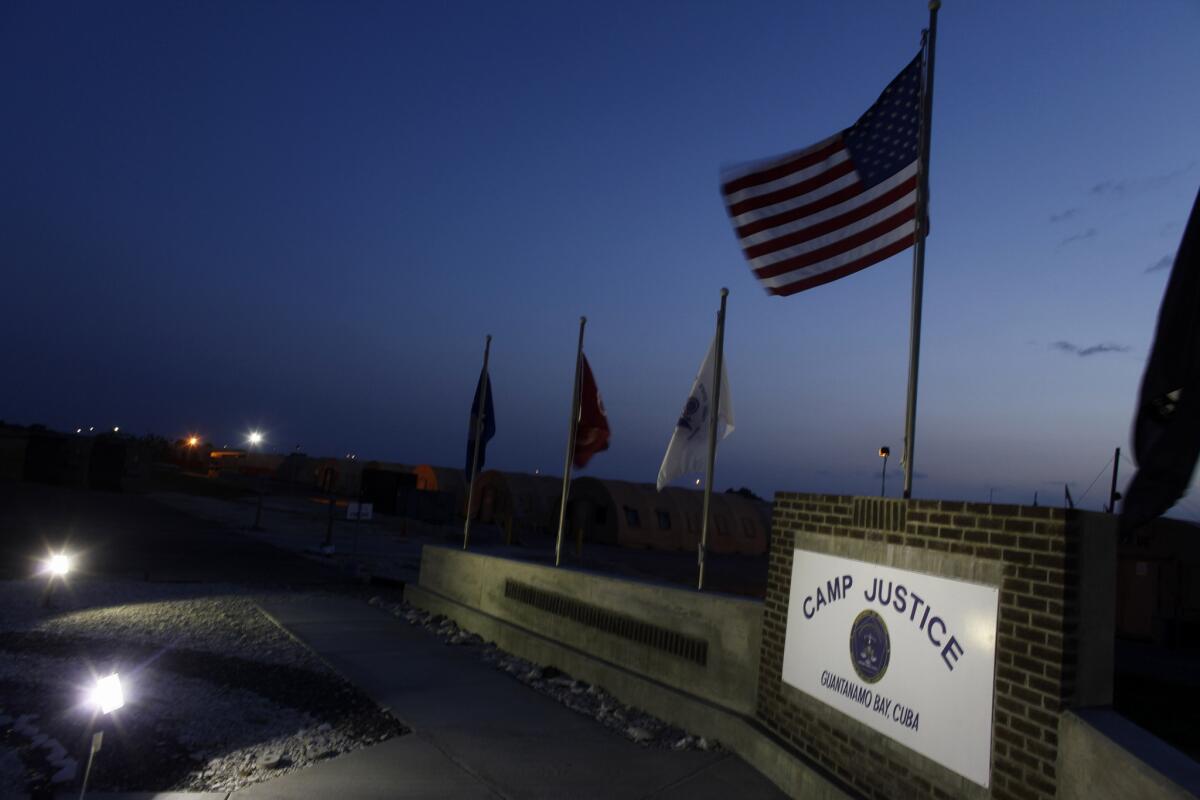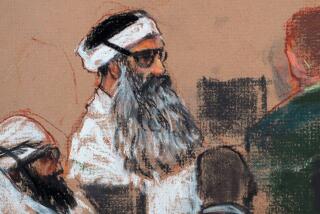Court ruling limits use of military commissions for terrorism suspects

The decision by the U.S. Court of Appeals for the District of Columbia Circuit could have an impact on many of the detainees at the U.S. military prison at Guantanamo Bay, Cuba, according to legal experts.
An important federal appeals court Friday reduced the powers of military commissions to try terrorism suspects for certain crimes, reopening the debate over whether such cases should instead be handled by civilian courts.
The decision by the U.S. Court of Appeals for the District of Columbia Circuit could have an impact on many of the detainees at the U.S. military prison at Guantanamo Bay, Cuba, according to legal experts.
The D.C. Circuit Court said that military commissions like those that operate at Guantanamo do not have the power to handle cases involving lesser charges such as conspiracy or providing material support for terrorism, which can also be prosecuted in U.S. civilian courts.
Their jurisdiction, said two of three judges on the panel, is limited to recognized international war crimes.
The decision immediately resurrected a long-simmering debate over whether people captured by the U.S. in Afghanistan and elsewhere on suspicion of supporting Al Qaeda and other terrorist groups should be tried in civilian courts rather than the military commissions at Guantanamo.
The decision “underscores what so many of us have been saying for years,” said Sen. Patrick J. Leahy of Vermont, the top Democrat on the Senate Judiciary Committee. “America stands on stronger legal and moral ground when we use our federal courts to try terrorists for their crimes.”
The decision overturned the last remaining conviction against Ali Hamza Bahlul, a Yemeni who allegedly served as Osama bin Laden’s public relations director and created videos glorifying Al Qaeda’s attacks against the U.S.
Judge Karen Henderson, who dissented from the ruling by Judges Judith Rogers and David Tatel, likened Bahlul to Hitler’s propagandist Joseph Goebbels and said Bahlul had bragged about his role in the Sept. 11 attacks.
Henderson warned that the impact of the decision would go far beyond Bahlul’s case.
“My colleagues bar the government from employing military commissions to try individuals who conspire to commit war crimes against the U.S.,” she said, adding that in the future, military commissions would not be able to try any offense not “condoned” by the international community.
“Their timing could not be worse,” Henderson warned, referring to the mounting Islamic State threat in Iraq and Syria.
Steve Vladeck, an expert on national security law at American University in Washington, wrote in a blog post that “this is a Very. Big. Deal.” He said it would limit the future of Guantanamo commissions to the Sept. 11-related trial of Khalid Shaikh Mohammed and perhaps one other prisoner among the 122 detainees still at the military prison.
Eugene Fidell, who teaches military law at Yale Law School, agreed with Vladeck’s assessment and said it was time to end the use of military commissions.
“There is so little left to the potential jurisdiction of military commissions,” Fidell said. “This patient is dying on the operating people, and it is time we said ‘do not resuscitate.’”
Though the Supreme Court has overturned decisions of the D.C. Circuit on Guantanamo, it was not immediately clear whether the Obama administration would appeal, given its preference for using civilian courts.
“The Defense Department is studying the judges’ ruling and exploring all legal options,” said Army Lt. Col. Myles Caggins, the Defense Department spokesman for military commissions.
Former Atty. Gen. Eric H. Holder Jr. said before leaving his post this year that the Sept. 11 defendants would have been convicted by now and facing execution if he had been allowed to try them in New York. But plans to do that caused an uproar of criticism from Democrats as well as Republicans, and Congress moved to block it.
Twitter: @timphelpsLAT
More to Read
Sign up for Essential California
The most important California stories and recommendations in your inbox every morning.
You may occasionally receive promotional content from the Los Angeles Times.











